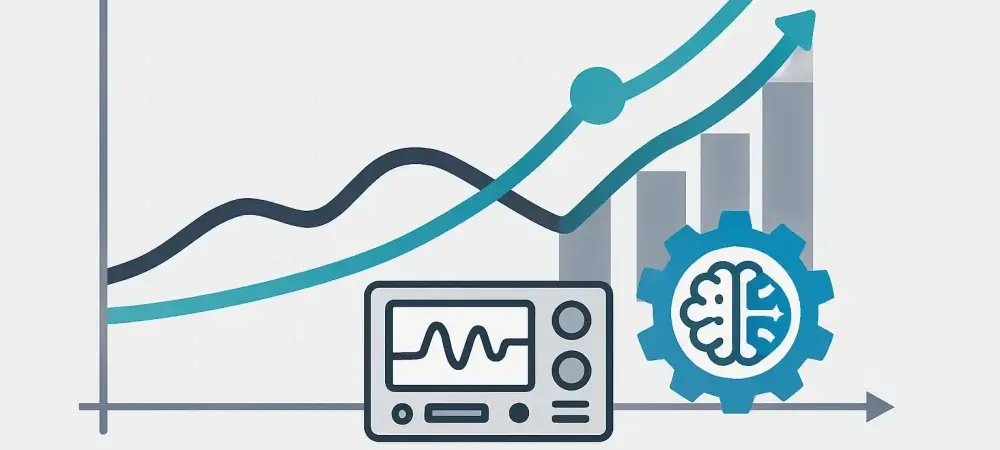In the era of rapid technological advancement, artificial intelligence has emerged as a transformative force across varied sectors. One area witnessing a significant impact from AI integration is the realm of test and measurement. The adoption of AI is reshaping traditional practices, enhancing precision and efficiency, and paving the way for unprecedented technological capabilities. This trend is not just a functional enhancement but a strategic imperative, pushing the boundaries of what testing technology can achieve. This article delves into the current landscape, expert insights, and future outlook of AI integration in the test and measurement sector, offering a comprehensive understanding of its implications and potential.
Current Landscape and Adoption of AI in Test and Measurement
Data-Driven Insights and Adoption Metrics
The increasing integration of AI into test and measurement processes is underscored by notable data-driven insights that highlight continually growing adoption rates. Reports indicate that companies are progressively embedding AI solutions to enhance testing protocols, leading to emergent growth patterns in the sector. Industry projections suggest a steep upward trajectory, predicting that by the end of the decade, AI’s role in shaping advanced testing tools and methodologies will expand even further, impacting more than a quarter of the testing market.
A plethora of industry studies supports these trends, indicating a marked increase in the receptivity of companies to adopt AI-driven testing tools. This shift is driven largely by the need for more sophisticated data analysis, accelerated testing speed, and improved accuracy in results. As industries increasingly look to optimize testing frameworks, AI offers a compelling pathway to achieve these objectives, fostering a forward-thinking approach to quality and innovation in test and measurement.
Real-World Applications and Case Studies
The real-world application of AI in test and measurement exemplifies both innovation and practical transformation. Amphenol, a leader in the field of electronic connectors and testing solutions, epitomizes this integration by employing AI across its range of high-tech interconnect products. By utilizing AI-powered insights, Amphenol has considerably enhanced its testing efficiencies, effectively capturing new market opportunities through strategic acquisitions.
Similarly, Emerson has taken significant strides by incorporating AI capabilities into its NI test software, notably with its AI advisor, Nigel. This addition has bolstered the software’s potential to handle complex testing environments with greater precision, securing Emerson’s place at the forefront of AI-driven testing technology. Such initiatives demonstrate AI’s tangible value in optimizing testing processes, enabling companies like Emerson to meet and exceed industry demands with innovative solutions.
Expert Perspectives and Industry Insights
Leading experts in the test and measurement industry provide invaluable insights into AI’s transformative role. Thought leaders highlight AI’s potential to address existing challenges, particularly in data management and process automation. These experts underscore the strategic importance of embracing AI and the role it plays in maintaining a competitive edge.
Perspectives shared by industry veterans emphasize that while AI integration offers immense advantages, it also brings challenges including data privacy concerns and the need for a skilled workforce adept at managing AI systems. As AI becomes ingrained in testing cultures, companies must navigate these challenges with robust training and ethical frameworks, ensuring that AI utilization aligns with broader organizational goals and industry standards.
Future Outlook and Implications of AI Integration
Looking ahead, the trajectory for AI in test and measurement is poised for continued expansion and refinement. Emerging developments hint at new capabilities in predictive analytics, automated testing, and real-time data analysis, promising to unlock further efficiencies and elevate process workflows. However, this evolution is not without hurdles, as industries face the dual challenges of leveraging AI’s full potential while safeguarding against associated risks. The future of AI integration will also have far-reaching implications across diverse sectors beyond just testing. As industries explore interconnected systems and smarter automation, AI is set to redefine the landscape, fostering holistic improvements in efficiency, quality, and innovation while requiring vigilance against potential misuse and ethical concerns.
Conclusion and Forward-Looking Statements
In conclusion, AI is revolutionizing the test and measurement sector, turning once-static processes into dynamic, intelligent operations. This paradigm shift underscores the essential nature of AI as both a tool and a strategy, driving advancements in efficiency and accuracy. As businesses embrace this trend, they must remain nimble, continuously exploring AI’s expanding capabilities while addressing existing challenges. The path forward necessitates an enduring commitment to innovation, adaptation, and ethical stewardship, paving the way for a future where AI’s integration shapes new benchmarks for technological progress and capability.

